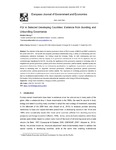FDI in Selected Developing Countries: Evidence from Bundling and Unbundling Governance

View/
Use this link to cite
http://hdl.handle.net/2183/24548Collections
Metadata
Show full item recordTitle
FDI in Selected Developing Countries: Evidence from Bundling and Unbundling GovernanceAuthor(s)
Date
2019Citation
Asongu, S. (2019). FDI in Selected Developing Countries: Evidence from Bundling and Unbundling Governance. European Journal of Government and Economics, 8(2), 161-188. https://doi.org/10.17979/ejge.2019.8.2.4970
Abstract
[Abstract] The objective of this study is to assess governance drivers of FDI in a panel of BRICS and MINT countries for the period 2001-2011. We bundle and unbundle governance determinants using a battery of contemporary and non-contemporary estimation techniques. Our findings reveal the following: Firstly, for both contemporary and non-contemporary specifications, while the majority of our governance determinants of Gross FDI are significant, they are overwhelmingly insignificant for Net FDI. Secondly, the significance of the governance dynamics in increasing order of magnitude are general governance, political governance, economic governance, political stability, regulation quality and government effectiveness. Thirdly, for non-contemporary specifications, the significance of governance variables is as follows in ascending order of magnitude: economic governance, institutional governance, general governance, corruption-control, political governance and political stability. The importance of combining governance indicators is captured by the effects of political governance, economic governance and institutional governance. The results indicate that the simultaneous implementation of the various components of governance clarifies a country’s attractiveness for FDI location. Policy implications are discussed with particular emphasis on the timing of FDI and its targeting.
Keywords
Foreign direct investment
Emerging countries
Governance
Emerging countries
Governance
Editor version
Rights
Atribución-NoComercial 4.0 España
ISSN
2254-7088






